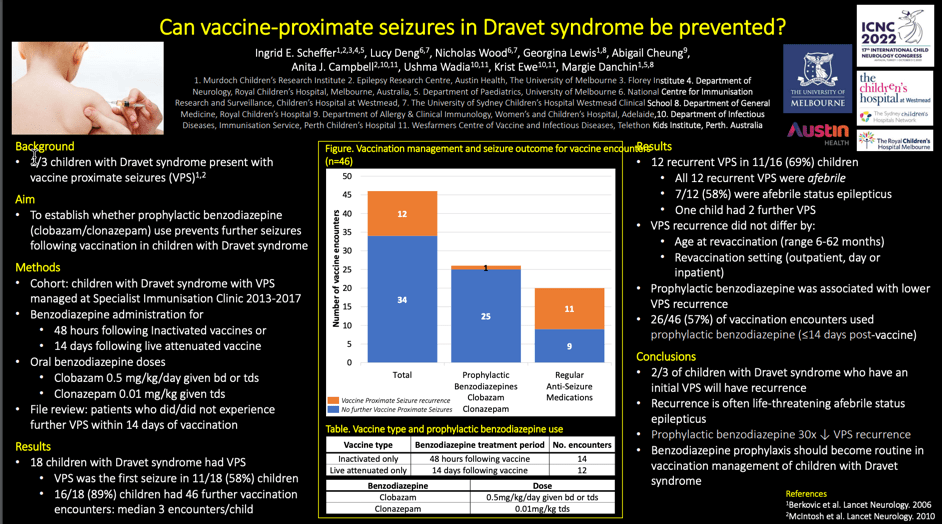Can vaccine-proximate seizures in Dravet syndrome be prevented?
Ingrid Scheffer, Lucy Deng, Nicholas Wood, Georgina Lewis, Abigail Cheung, Anita Campbell, Ushma Wadia, Krist Ewe, Margie Danchin
Background: One-third of children with Dravet syndrome present with seizures proximate to vaccination (VPS) . We aimed to establish whether prophylactic benzodiazepine use prevented further seizures following vaccination in children with Dravet syndrome.
Methods: Retrospective multicentre cohort study of children with Dravet syndrome and previous VPS managed at a Specialist Immunisation Clinic between 2013-2017. We obtained clinical history, vaccination management and outcomes from medical records. We compared the management of patients who did/did not experience further VPS within 14 days of vaccination.
Findings: 18 children with Dravet syndrome who had a previous VPS were identified. In 11/18 (58%) children, the VPS was their first seizure. 16/18 children had further vaccination encounter(s) (46 encounters, median 3 encounters/child). There were 12 recurrent VPS in 11/16 (69%) children, with one child having two further VPS; all 12 were afebrile seizures and 7 (58%) were afebrile status epilepticus. VPS recurrence did not differ by age at revaccination (range: 6-62 months) or revaccination setting (outpatient, day stay or inpatient). Prophylactic benzodiazepine (clobazam/clonazepam) was effective with use in 26/46 (57%) of vaccination encounters and it was associated with lower VPS recurrence (odds ratio OR 0.033 (95%CI 0.004-0.291),P <0.01).
Interpretation: Of children with Dravet syndrome who have an initial VPS, 2/3 will have recurrent VPS, most frequently comprising life-threatening episodes of afebrile status epilepticus. Prophylactic post-vaccination use of benzodiazepine lowered the likelihood of VPS recurrence 30 fold. Benzodiazepines in at-risk post-vaccination period should be routinely implemented into vaccination management in children with confirmed or suspected Dravet syndrome.
Keywords: Dravet syndrome, Vaccination, Prophylaxis, Benzodiazepines, Vaccine-proximate seizures
Ingrid Scheffer
University of Melbourne
Australia
Lucy Deng
National Centre for Immunisation Research and Surveillance
Australia
Nicholas Wood
National Centre for Immunisation Research and Surveillance
Australia
Georgina Lewis
Murdoch Children’s Research Institute
Australia
Abigail Cheung
Women’s and Children’s Hospital
Australia
Anita Campbell
Perth Children's Hospital
Australia
Ushma Wadia
Perth Children's Hospital
Australia
Krist Ewe
Perth Children's Hospital
Australia
Background: One-third of children with Dravet syndrome present with seizures proximate to vaccination (VPS) . We aimed to establish whether prophylactic benzodiazepine use prevented further seizures following vaccination in children with Dravet syndrome.
Methods: Retrospective multicentre cohort study of children with Dravet syndrome and previous VPS managed at a Specialist Immunisation Clinic between 2013-2017. We obtained clinical history, vaccination management and outcomes from medical records. We compared the management of patients who did/did not experience further VPS within 14 days of vaccination.
Findings: 18 children with Dravet syndrome who had a previous VPS were identified. In 11/18 (58%) children, the VPS was their first seizure. 16/18 children had further vaccination encounter(s) (46 encounters, median 3 encounters/child). There were 12 recurrent VPS in 11/16 (69%) children, with one child having two further VPS; all 12 were afebrile seizures and 7 (58%) were afebrile status epilepticus. VPS recurrence did not differ by age at revaccination (range: 6-62 months) or revaccination setting (outpatient, day stay or inpatient). Prophylactic benzodiazepine (clobazam/clonazepam) was effective with use in 26/46 (57%) of vaccination encounters and it was associated with lower VPS recurrence (odds ratio OR 0.033 (95%CI 0.004-0.291),P <0.01).
Interpretation: Of children with Dravet syndrome who have an initial VPS, 2/3 will have recurrent VPS, most frequently comprising life-threatening episodes of afebrile status epilepticus. Prophylactic post-vaccination use of benzodiazepine lowered the likelihood of VPS recurrence 30 fold. Benzodiazepines in at-risk post-vaccination period should be routinely implemented into vaccination management in children with confirmed or suspected Dravet syndrome.
Keywords: Dravet syndrome, Vaccination, Prophylaxis, Benzodiazepines, Vaccine-proximate seizures
Ingrid Scheffer
University of Melbourne
Australia
Lucy Deng
National Centre for Immunisation Research and Surveillance
Australia
Nicholas Wood
National Centre for Immunisation Research and Surveillance
Australia
Georgina Lewis
Murdoch Children’s Research Institute
Australia
Abigail Cheung
Women’s and Children’s Hospital
Australia
Anita Campbell
Perth Children's Hospital
Australia
Ushma Wadia
Perth Children's Hospital
Australia
Krist Ewe
Perth Children's Hospital
Australia

Ingrid Scheffer
University of Melbourne Australia
University of Melbourne Australia